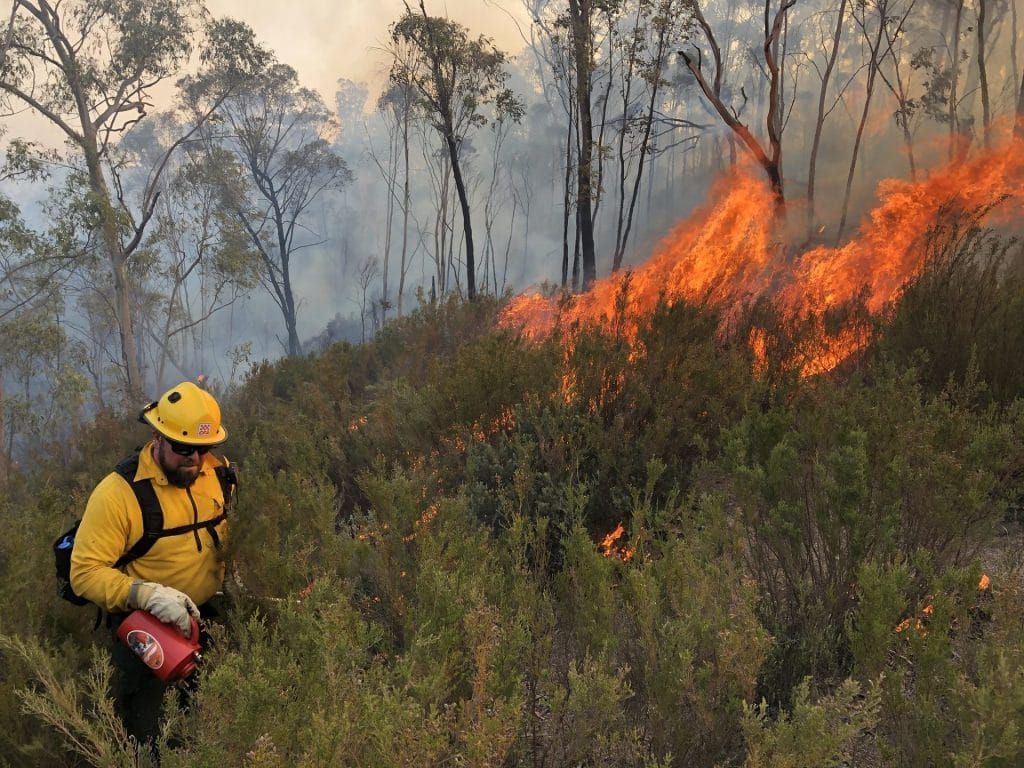Bloomberg: Masking an inadequate plan with “snazzy climate ads”?
By Emily Holden | March 2, 2020
 Clay Stephens, a firefighter from Idaho, assists with a wildfire (what Aussies call a “bushfire”) near the Tambo Complex Fire in the Australian state of Victoria. Image courtesy BLM-Idaho.
Clay Stephens, a firefighter from Idaho, assists with a wildfire (what Aussies call a “bushfire”) near the Tambo Complex Fire in the Australian state of Victoria. Image courtesy BLM-Idaho.
Editor’s note: This story was originally published by The Guardian. It appears here as part of the Climate Desk collaboration.
Michael Bloomberg has donated hundreds of millions of dollars to environmental advocacy causes, but his campaign is coming under fire for a climate plan that lags far behind the other Democratic candidates for president.
In the latest televised Democratic presidential debate on Wednesday night, Bloomberg said he wouldn’t “go to war with China” over its highest-in-the-world carbon emissions. He called fracked gas a “transition fuel,” and said that “we want to go to all renewables, but that’s still many years from now.” But, he added: “The world is coming apart faster than any scientific study had predicted. We’ve just got to do something now.”
The former New York City mayor has committed to rejoining the international climate agreement that Donald Trump plans to exit. He says he would cut carbon pollution in half by 2030 and pursue a 100 percent clean energy standard, both on par with what scientists say is needed. But he has offered few details on how he would achieve those goals compared with his competitors. He has broadly pledged to financially support new energy technology, nix fossil fuel tax subsidies and issue a new federal rule for power plant emissions.
One organization, the Center for Biological Diversity’s Action Fund, ranks Bloomberg’s plan last out of six contenders—tied with the Minnesota senator Amy Klobuchar. By comparison, the group gives the Vermont senator Bernie Sanders a perfect score. Sanders would declare a national climate emergency, end fossil fuel production and exports, ban fracking for fossil gas, prosecute oil companies for their role in the crisis and give the public—rather than private companies—control of the power system.
Brett Hartl, chief political strategist for the Center for Biological Diversity’s Action Fund, said Bloomberg, who came to the race late and is massively outspending his peers on advertising, is trying to mask his inadequate plan with “snazzy climate ads.”
“There’s no discussion about how he would actually accomplish any of this and most of it is frankly sort of vague things that actually Congress would have to do,” Hartl said. “It’s just not very ambitious, there aren’t a lot of details and when you look at all of the other candidates it’s probably the least fleshed-out plan of any of them.”
Bloomberg spokeswoman Daphne Wang said: “When it comes to comparing the candidates’ plans, most have similarly aggressive targets for decarbonizing the US economy, but we think that Mike has a more detailed and concrete, practical plan for how to actually meet those goals.”
She added: “His plans look at every possible lever for climate action—using executive authority, budget and tax bills, and appropriations bills, not just legislation—so that he can maximize climate progress regardless of whether the Senate is in Democratic control.”
Wang said some rankings are focused on shutting down fossil fuels, ceasing production and exports, but “the difference with these groups’ priorities is a difference of strategy, not goals.”
“These rankings assume that the most effective way of reducing fossil fuel usage is to limit the supply; Mike thinks the way for the world to move beyond coal, oil, and gas is to replace them with something cleaner,” she said.
She added that “unlike most of his primary rivals, Mike has actually meaningfully reduced emissions,” including by helping to retire more than half the US coal fleet with contributions to the Sierra Club.
While the climate crisis is increasingly important to voters, it falls behind other concerns, particularly about the state of healthcare in the US, according to a new poll from Politico and Harvard’s TH Chan School of Public Health. A little more than half of respondents, and 68 percent of Democrats, said that “making major increases in federal spending and regulation to reduce climate change” is an “extremely” or “very important” priority.
But some advocates worry that without further review voters will assume Bloomberg’s climate plan is sufficient because of his background.
Bloomberg is the only candidate who hasn’t committed to an overall climate spending level, which his campaign said is because his various policy plans are related and can only be assessed once they are all rolled out.
Sanders says his blueprint would cost $16 trillion. At the lower end of the range candidates have pledged, Klobuchar would spend $1trillion on energy infrastructure. Bloomberg also doesn’t specify a date by which he would phase out fossil fuels, although he says his first priority would be to issues a series of executive actions to reach 80 percent clean electricity within eight years.
A high-profile philanthropist, Bloomberg is hugely influential in environmental advocacy, having spent big on many groups, including the Sierra Club’s Beyond Coal campaign, which funded lawyers to bring legal battles against coal plants at the state level.
Last summer Bloomberg pledged $500 million to a new program called Beyond Carbon, aimed at closing every coal plant in the country and halting the growth of gas-powered electricity.
As one of the richest people in the United States, Bloomberg has also built a large political and support network for local leaders, and he has won endorsements from high-profile mayors, including London Breed in San Francisco.
By entering the race late, Bloomberg escaped scrutiny of his major policy proposals. He also dodged pressure from activists such as the youth-run Sunrise Movement, which argues that despite Bloomberg’s record of climate advocacy he’s not aligned with the “vision and values” of a Green New Deal—a broader reimagining of American society that would address both inequity and the climate crisis—which Sanders outlined and co-sponsored with the New York congresswoman Alexandria Ocasio-Cortez.
The Sunrise Movement—which has endorsed Sanders—has criticized Bloomberg, a former Republican, for fighting labor unions and backing the re-election of Michigan’s former Republican governor Rick Snyder following the water crisis in Flint.
The group says Bloomberg’s history of supporting racial profiling through New York’s stop-and-frisk programs, which he has since renounced, is at odds with a Green New Deal. And the organization has highlighted how he has backed gas as a replacement to coal.
Coal has a higher carbon output than gas, but gas is increasingly a major threat to climate progress. Bloomberg would not ban fracking, a method of extraction that has made a huge amount of cheap gas available to drillers.
Bloomberg’s campaign pushed back on the criticism, arguing he supports the right to form unions and has a “progressive agenda for criminal justice reform.”
“While gas played a role in the early stages of retiring coal plants because it was less polluting and cheaper for consumers, once renewable energy became even cheaper than gas, Mike announced his investment in Beyond Carbon—and his goal to stop the expansion of gas plants,” his campaign said.
Bloomberg also supported the Keystone XL pipeline which would move petroleum from oil sands in Canada.
Julian Brave NoiseCat, director of Green New Deal strategy for the thinktank Data for Progress, said Bloomberg’s late entry has allowed “for a very easy narrative for him, which is that he’s a big philanthropist that has put his money where his mouth is and done a lot for funding of climate [work].
“We need a more substantive conversation about what the difference is between what looks like the two frontrunners,” NoiseCat said. He said he “wouldn’t be surprised if more and more activists show up to his rallies and take him to task.”
On the other hand, he added, “having someone who could spend basically unlimited money on paid media and could leverage his massive philanthropy and political network to just mobilize the gears on climate and make something happen is worth sitting with for a minute.”
Together, we make the world safer.
The Bulletin elevates expert voices above the noise. But as an independent nonprofit organization, our operations depend on the support of readers like you. Help us continue to deliver quality journalism that holds leaders accountable. Your support of our work at any level is important. In return, we promise our coverage will be understandable, influential, vigilant, solution-oriented, and fair-minded. Together we can make a difference.
Keywords: 2020 presidential election, Bloomberg, Green New Deal, climate change, climate crisis
Topics: Climate Change














